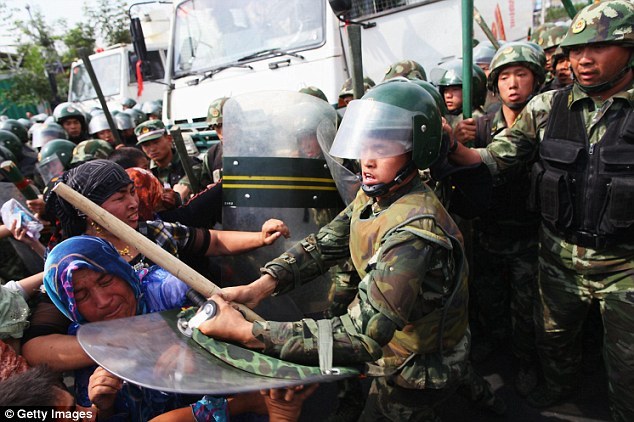The Detainment of Muslims in China
Uighur Muslims riot against government in Xinjiang region
January 14, 2019
In August of 2018, a UN committee member reported that up to one million Uighur and other groups of Muslims were being held captive in camps or, as the state calls them, “political re-education” programs, in Xinjiang, in western China.
According to BBC News, Uighur Muslims are ethnically Turkic Muslims, and there are about 11 million of them living in western China. BBC News also reported that Human Rights Watch groups have determined that the people in the camps have been forced to learn Mandarin Chinese and criticize, or renounce, their faith. The New York Times found that up to 1 million ethnic Uighurs, and other Turkic-speaking Muslims, are being held in Xinjiang’s camps, according to a U.N. report released in August.
NBC News reported that Omurbek Eli, an ethnic Uighur, told Radio Free Asia that at these camps he learned Mandarin Chinese, sang patriotic songs, studied Communist Party laws and regulations, and took weekly exams. “Sleeping hours were from 12 a.m. to 6 a.m. In the morning, all beds had to be made in military style.” Eli recalled. “If one failed to do so, it was considered an ideological failure. Instructors informed you of trials and sentences, and what offenses they were related to. This was to create fear,” he said. “I now suffer from post-traumatic disorder and can no longer sleep properly.”
The New York Times reported the experience of a young man named Abdusalam Muhemet, and his family, in the camp. Muhemet, age 41, said the police detained him for reciting a verse of the Quran at a funeral. After two months in a nearby camp, he and more than 30 others were ordered to renounce their past lives. Mr. Muhemet said he went along with these demands but quietly seethed.
Also according to the New York Times, nearly every morning, Muhemet and dozens of others were told to run around an assembly ground. Impatient guards sometimes slapped and shoved the older, slower inmates, Muhemet said. Then, they were made to sing rousing patriotic hymns in Chinese, such as “Without the Communist Party, There Would Be No New China.” Those who could not remember the words were denied breakfast, and they all learned the words quickly. Mr. Muhemet, a stocky man who ran a restaurant in Hotan before fleeing China this year, said that he spent seven months in a police cell and more than two months in the camp in 2015 without ever being charged with a crime. Most days, he said, the camp inmates assembled to hear long lectures by officials, who warned them not to embrace Islamic radicalism, support Uighur independence, or defy the Communist Party. The officials did not ban Islam but instead dictated very narrow limits for how it should be practiced, including a prohibition against praying at home if there were friends or guests present, he said. During other sessions, the inmates were forced to memorize laws and write essays criticizing themselves.
After two months, Mr. Muhemet’s family was finally allowed to visit the camp, located near New Harmony Village, a settlement built as a symbol of friendship between ethnic Uighurs and the majority Han Chinese. “I couldn’t say anything,” he recalled. “I just held my two sons and wife, and cried and cried.”
Giving up alcoholic beverages and smoking, having too many children, owning a tent or a compass, refusing to let officials take a retinal scan or a DNA sample, giving a deceased relative a traditional Muslim burial instead of cremation, traveling abroad, or just having spoken with someone who has are just some of the offenses for which these people are being sent to these facilities to be “re-educated” and taught how to properly follow Islam.
According to NBC News, on October 16, the governor of Xinjiang, Shohrat Zakir, delivered the most detailed justification to date for the re-education camps, describing inmates as “students” in Xinjiang’s “vocational education and training program.” According to BBC News, there is increasing international condemnation of China’s treatment of Uighur Muslims but, as of now, no nation has taken any concrete action.
Global Times, a pro-government daily newspaper that often publishes nationalistic viewpoints, has praised the “vocational training centers, where people who are brainwashed by extreme thoughts and have committed misdemeanors” are taught the Chinese language, laws and job skills. According to Zakir, camp inmates live in air-conditioned dorms under “humane” conditions. They watch movies. They acquire job skills to become tailors, e-commerce traders, and hairdressers. Zakir’s statement, reported at length by China’s state-run Xinhua News Agency, reflected a new approach by Beijing: an all-out propaganda campaign to legitimize its practices in the region.

















































































































































